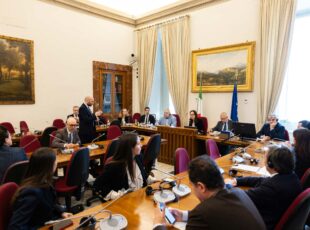Newsletter October 2012
The Heinrich Boell Foundation
Khodorkovsky: “I will not join Russian Opposition Coordination Council”
Khodorkovsky wished the organisers and candidates well, stating that he hoped the Council will promote the consolidation of civil society and become a truly collegial body, demonstrating “an effective democratic alternative to today’s personality-dominated regime”.
German Politician Not Allowed Prison Visit with Khodorkovsky
Marieluise Beck, German Green Party spokesperson for Eastern European Affairs, travelled to Khodorkovsky’s remote prison colony but was refused a visit with him.
Visits with Khodorkovsky occur only under strict conditions, and his parents had sacrificed their right to their next scheduled visit in order to allow their son to meet with the prominent German politician.
Commenting on her trip via Twitter, Beck confirmed she had arrived at the prison and understood that Khodorkovsky had transferred his parents’ visiting rights to her, but the authorities refused to let the visit proceed. After staying overnight in the vicinity, hoping she might be allowed the visit the next day, Beck ultimately had to leave without having met Khodorkovsky. The prison authorities had been informed by Khodorkovsky of Beck’s pending visit, however they told Beck that apparently they had not received this information from the prisoner.
A long-time supporter of Khodorkovsky, Beck observed several sessions of the proceedings at Moscow’s Khamovnichesky Court during Khodorkovsky’s second trial, which ran from 2009 to 2010.
“I Miss the Word ‘Love’” – Khodorkovsky
Khodorkovsky contributed to the Moscow News “Word and Anti-Word” series, citing the most significant words for him, personally, as “love, companionship and freedom” as well as “God”. In the piece he highlights the importance of love, admitting that while imprisoned he misses the phrase “I love” most, only hearing it during rare family visits and brief permitted telephone calls.
The words “fascist”, “traitor” and “apathy” encapsulate, he says, what most antagonizes him, reserving the strongest scorn for the concept of a traitor, “a disgusting creature, contact with whom only gets you dirty”.
Khodorkovsky also addresses the issue of political discourse, noting that speeches of Russia’s topmost politicians are frequently peppered with vulgarities. The responsibility of having a broad audience, he suggests, means politicians have an obligation to “lift” the general level of discourse.
Finally, Khodorkovsky explains that the current slogans of the Russian protest movement articulate society’s shifting dissatisfaction onto Putin personally which, he claims, is right. However, he suggests slogans depicting Russia’s progress should also include important words such as “honesty”, “fairness”, “renewal”, and “make way for the young”.
Henry Jackson Society Launches White Ribbon Project
The Russia Studies Centre at the Henry Jackson Society launched a video campaign called “The White Ribbon Project”, featuring commentaries from a variety of Russian citizens, oppositionists, and civil society leaders, including former Prime Minister Mikhail Kasyanov, discussing what motivates them to continue their fight for democracy and human rights in Russia.
The Henry Jackson Society declared that “from calls for freedom of expression to the desire to challenge corruption and electoral fraud, the white ribbon ultimately carries a simple message: the peaceful demand for the dignity that derives from equality under the law and genuine democratic representation.”
Case Developments
Court Reverses Early Release for Platon Lebedev
In August, cautious optimism emerged amongst supporters of Khodorkovsky and his former business partner Platon Lebedev, after a court in the town of Velsk – where Lebedev is serving his prison term – ruled that Lebedev should be freed in March 2013, reducing his thirteen-year sentence by three years and four months. Lebedev and Khodorkovsky have been co-defendants in two trials since their 2003 arrests, receiving the same verdicts and sentences. Lebedev applied earlier this year for a reduction in his sentence, and it was believed that the treatment of Lebedev could foreshadow the treatment of Khodorkovsky should the latter make a similar application.
However, prosecutors appealed against the court’s ruling, and any optimism was dashed on September 21 when a court in Arkhangelsk sided with the prosecutors, reversing the “excessively lenient” reduction of Lebedev’s sentence and sending the case back to the lower court for review.
Khodorkovsky’s mother, Marina Khodorkovskaya, commented on the reversal, saying there were no words to describe the decision “other than mockery and a disgrace to our justice.”
Moscow City Court Delays Review of 2010 Khodorkovsky-Lebedev Conviction
Meanwhile, on the eve of the Arkhangelsk court’s decision denying Lebedev’s early release, Interfax reported that Moscow City Court Chair Olga Yegorova responded to Khodorkovsky-Lebedev defence complaints over continued stalling of a review of the 2010 conviction. On July 24, the Russian Supreme Court ordered the Moscow City Court to proceed with a review of the conviction. Yegorova pointed to the separate proceedings over Lebedev’s early release and stated that her court’s review of the Khodorkovsky-Lebedev conviction would be on hold until the eventual outcome of Lebedev’s early release application is enforced.
Khodorkovsky’s and Lebedev’s lawyers protested the Moscow City Court’s unlawful excuse for once again delaying review proceedings – this time potentially for months – as their clients sit in prison. Since October 2011, both Lebedev and Khodorkovsky have served out the 8-year sentences handed down in their first trial, meaning their incarceration today is based on the 13-year sentences handed down after their second conviction, currently under review.



